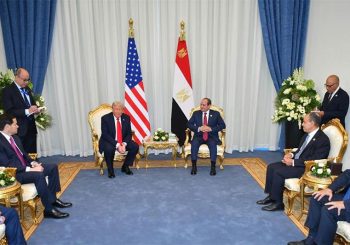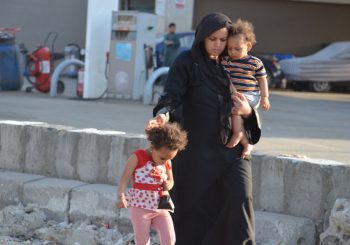UN Secretary-General (UNSG) Antonio Guterres held a press conference on Friday, 20 October, at the Egyptian side of the Rafah crossing, calling for an “immediate humanitarian ceasefire.”
“We are actively engaging with all the parties in order to clarify these restrictions so we can have these trucks moving towards where they’re needed. We need these trucks moving as soon as possible,” he said.
Egypt has started removing concrete barriers at the Rafah crossing, according to an Egyptian security source who informed AFP on Friday, 20 October. Witnesses reported that Egyptian vehicles and equipment entered the Palestinian side to repair the roads that had been bombed earlier by Israeli airstrikes.
Guterres visited Egypt on Thursday, 19 October, to meet with Egyptian Foreign Minister Sameh Shoukry. The two held a joint press conference, during which the UNSG reiterated the critical importance of upholding international humanitarian law and ensuring the safety of civilians. He further emphasized that international law unequivocally prohibits attacks on hospitals, schools, and United Nations facilities.
In Al Arish, he continued, “We have two million people here suffering tremendously. There is no water, no food, no medicine, no fuel. Gaza needs everything to survive.”

Guterres emphasized that humanitarian aid trucks are “a lifeline. They are the difference between life and death for so many people.”
An Israeli army spokesperson has stated that the timing for the entry of humanitarian aid into Gaza through the Rafah crossing “is to be determined.”
The Israeli government had previously announced that it would not obstruct the flow of humanitarian aid into the besieged Gaza Strip from Egypt. This decision followed international pressure from Israel’s allies. It’s important to note that hundreds of thousands of Gaza residents have been forced to evacuate their homes due to ongoing Israeli airstrikes.
Throughout this week, world leaders have been coming to Cairo in an effort to de-escalate the Israel-Hamas War and work with the Egyptian administration on solutions to the humanitarian crisis.
US Secretary of State Antony Blinken visited Cairo on Sunday, 15 October, and planned to return to Israel for a second visit within a week, following a tour of six Arab nations to address the Israel-Palestine conflict.
During his meeting with Blinken, President Abdel Fattah Al Sisi asserted that Israel’s military operation in Gaza had gone beyond the bounds of self-defense, evolving into what he termed “a collective punishment,” as reported by Egypt’s state-run media.
German Chancellor Olaf Scholz also arrived in Egypt on Wednesday, 18 October, for discussions with Sisi regarding the situation in Israel and Gaza. Chancellor Scholz expressed the joint commitment of Germany and Egypt to alleviate the dire consequences of the ongoing conflict, stating, “Together with Egypt, we want to work to alleviate the terrible consequences of the war.”
British Prime Minister Rishi Sunak will visit Egypt on Friday, 20 October, as part of a tour around the Middle East to discuss the de-escalation of the ongoing Israeli airstrikes on the Palestinians in the Gaza Strip, the West Bank, and Jerusalem.
Sunak traveled to Saudi Arabia, where he met with Saudi Crown Prince Mohammed bin Salman, saying on his X account (formerly known as Twitter): “We agreed on coordinated action to prevent further escalation in the region, provide vital humanitarian aid in Gaza, and support stability, both now and in the long-term.”
Twelve world leaders are set to participate in an International Peace Summit hosted by Egypt this Saturday, 20 October, responding to a call made by Sisi to address the Gaza crisis. Egypt’s Foreign Affairs Minister Sameh Shoukry emphasized the gravity of the situation in Gaza and the urgent need to de-escalate tensions, establish a ceasefire, and work towards a two-state solution to address the long-standing conflict. French Foreign Affairs Minister Caritin Colonna confirmed France’s participation in the summit during a joint press conference in Cairo. This announcement follows an agreement between Sisi and US President Joe Biden to facilitate sustained humanitarian aid entry into Gaza through the Rafah border crossing.
The Conflict So Far
After a surprise attack conducted on 7 October by Hamas on a number of southern Israeli towns which resulted in the deaths of an estimated 1,200 people and more than 200 being taken ‘hostage’ by Hamas, Israel launched a retaliatory bombing campaign against what it describes as ‘terrorist targets’ in the Gaza Strip.
So far, 4,137 Palestinians have been killed in the Gaza Strip — over 1,000 of them children — and at least 13,000 others injured. Meanwhile, 81 Palestinians have been killed in the West Bank and 1,300 have been injured.
The priority of the Egyptian government since the beginning of the conflict has been deescalation and the securing of a path for aid to enter the Gaza Strip through the Rafah crossing. Israel bombed the crossing at least four times, and despite agreements to let through aid, the infrastructure remains damaged and aid is yet to cross.
Most Western countries, with the United States at the forefront, have expressed unconditional support for Israel, despite the steadily rising death toll in Gaza. Meanwhile, Arab governments have called for an immediate ceasefire.







Comment (1)
[…] UN Secretary-General Antonio Guterres Calls for Urgent Humanitarian Ceasefire at Rafah Crossing […]